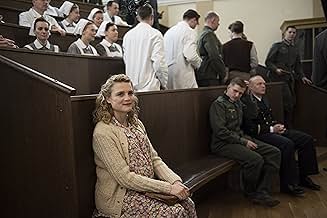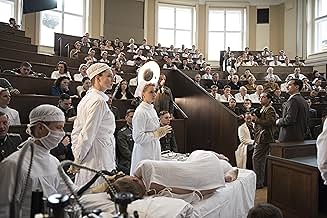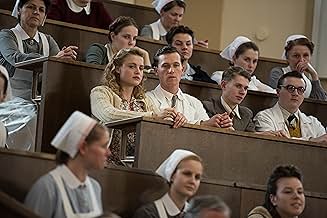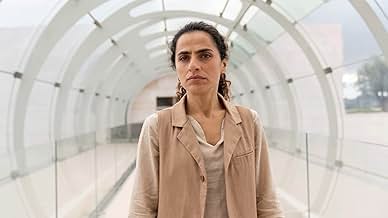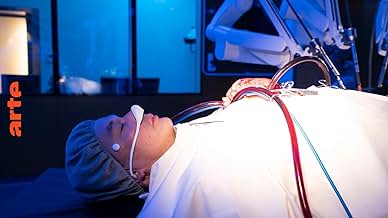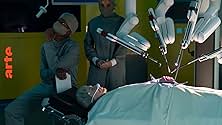Les exploits des plus célèbres médecins et scientifiques allemands du prestigieux hôpital de la Charité à Berlin au cour de son histoire.Les exploits des plus célèbres médecins et scientifiques allemands du prestigieux hôpital de la Charité à Berlin au cour de son histoire.Les exploits des plus célèbres médecins et scientifiques allemands du prestigieux hôpital de la Charité à Berlin au cour de son histoire.
- Récompenses
- 3 victoires et 9 nominations au total
Parcourir les épisodes
Avis à la une
The thing I found most fascinating about this series is the way normal people survive under fascist rule. The duality of being healers and having to follow the terrible laws of the Nazi regime come very much into play.
The production quality is superb. It is provocative and we'll worth watching.
A great WW II movie from an angle I never thought about before. I enjoyed the entire series but it was difficult watching the parts where the little kids were in their beds or being transferred. Something to think about on this hot summer day.
"Charite at War" covers the German hospital during World War II.
The film focuses on Anni (Mala Emde), her doctor husband Arthur (Artjom Gilz), the brilliant surgeon Sauerbruch, and Anni's brother (Otto Jannik Schumann), an in-the-closet gay. Given Rule 175, homosexuals who were caught were arrested and worse.
The group at the hospital reflects the differing views of citizens under Hitler's restrictions, some of whom display delusional thinking. Artur works with disabled children who are wards of the state as he works to develop a new vaccine. These children are eventually sent to another hospital, where Artur believes the children receive treatment, though the truth is, they are exterminated.
Sauerbruch goes along with Hitler's restrictions, but he believes he has a duty to all patients, and that includes Jews. He himself spoke to the Minister of Justice to end the extermination of children - and believes it is no longer happening.
Anni is a would-be doctor studying with Sauerbruch. Anni is comfortable that she and Artur have the correct genes. However, their new baby, Karin, possibly has hydrocephalus. This means she has to be reported and transferred, and that they may be sterilized. Instead, they treat the baby at home and then appeal to Sauerbruch for help. She and Artur face a crisis in their beliefs and in their marriage.
Otto falls in love with a male attendant at the hospital. There is a young nurse after him, who presses him for a commitment before he leaves for the service. When she doesn't get it, trouble ensues.
A cruel doctor accuses soldiers in the infirmary of faking their illness or wounded themselves, and they are sent for execution.
Meanwhile Germany is losing the war, and everyone hopes it will be over soon. Nobody seems to like Hitler. Sauerbruch thinks he's crazy. But they all live with terror.
Toward the end of the film, we see what Hitler sent out to fight - teenage boys. Pathetic.
An interesting cross-section of those who are secret spies and just plain keeping secrets as they try to get through their lives and survive Hitler.
"Charite at War" is depressing, and we see how the German people suffered. Toward the end of the war, there was no water, no supplies at the hospital, nothing, as doctors use liquor to sterilize their hands and anesthetize the patients.
And that's what happens when someone tells you that some people are superior to others, and anything that goes wrong with the country is the fault of these lesser people.
I'd say never forget, but it seems as though we have.
The film focuses on Anni (Mala Emde), her doctor husband Arthur (Artjom Gilz), the brilliant surgeon Sauerbruch, and Anni's brother (Otto Jannik Schumann), an in-the-closet gay. Given Rule 175, homosexuals who were caught were arrested and worse.
The group at the hospital reflects the differing views of citizens under Hitler's restrictions, some of whom display delusional thinking. Artur works with disabled children who are wards of the state as he works to develop a new vaccine. These children are eventually sent to another hospital, where Artur believes the children receive treatment, though the truth is, they are exterminated.
Sauerbruch goes along with Hitler's restrictions, but he believes he has a duty to all patients, and that includes Jews. He himself spoke to the Minister of Justice to end the extermination of children - and believes it is no longer happening.
Anni is a would-be doctor studying with Sauerbruch. Anni is comfortable that she and Artur have the correct genes. However, their new baby, Karin, possibly has hydrocephalus. This means she has to be reported and transferred, and that they may be sterilized. Instead, they treat the baby at home and then appeal to Sauerbruch for help. She and Artur face a crisis in their beliefs and in their marriage.
Otto falls in love with a male attendant at the hospital. There is a young nurse after him, who presses him for a commitment before he leaves for the service. When she doesn't get it, trouble ensues.
A cruel doctor accuses soldiers in the infirmary of faking their illness or wounded themselves, and they are sent for execution.
Meanwhile Germany is losing the war, and everyone hopes it will be over soon. Nobody seems to like Hitler. Sauerbruch thinks he's crazy. But they all live with terror.
Toward the end of the film, we see what Hitler sent out to fight - teenage boys. Pathetic.
An interesting cross-section of those who are secret spies and just plain keeping secrets as they try to get through their lives and survive Hitler.
"Charite at War" is depressing, and we see how the German people suffered. Toward the end of the war, there was no water, no supplies at the hospital, nothing, as doctors use liquor to sterilize their hands and anesthetize the patients.
And that's what happens when someone tells you that some people are superior to others, and anything that goes wrong with the country is the fault of these lesser people.
I'd say never forget, but it seems as though we have.
Very well made and great character studies. There were some inaccuracies such as the setting started out in the Autumn of 1943 and and there is a discussion about heading to Africa to be with Rommel. The North African campaign was lost by the Germans and over by the Spring of that year.
Many medical issues and procedures seem correct for its time, but the one doctor was doing mouth to mouth on a baby and that procedure did not come into practice until the 1950s. Perhaps that was to show the doctor was imaginative and non-conformist.
An event where the doctors were treating a hemo-pneumo thorax showed the doctors first interested in removing the metal in the chest, when in fact the priority is on relieving intrathoracic pressure via a chest tube or needle decompression and then stopping bleeding and then vascular and tissue repair. Getting the bullet out is something Hollywood has been hung up on from the beginning. The doctor though, does explain why he wants to look for the metal and remove it, perhaps to appease those that would question it, but the priority was off.
Anyway, the show is a must for those interested in history and/or medical shows.
A very good show.
I liked the telling of the beginnings of modern bacteriology. I had Google on the ready, to look up every new name which appeared - they were people who had a huge impact on our world. They are shown with all their faults and failings, as well as their successes.
I was sceptical about the introduction of Arthur Conan Doyle (creator of Sherlock Holmes), which I thought was just a dramatic device, but Google showed it to be factual, and what followed on was also based on fact.
An extremely interesting, and educational (in the good sense of the word) series.
I liked the telling of the beginnings of modern bacteriology. I had Google on the ready, to look up every new name which appeared - they were people who had a huge impact on our world. They are shown with all their faults and failings, as well as their successes.
I was sceptical about the introduction of Arthur Conan Doyle (creator of Sherlock Holmes), which I thought was just a dramatic device, but Google showed it to be factual, and what followed on was also based on fact.
An extremely interesting, and educational (in the good sense of the word) series.
Le saviez-vous
- AnecdotesSeason 3 takes place in Berlin, summer 1961.
- ConnexionsReferenced in Riverboat - Die MDR-Talkshow aus Leipzig: Folge vom 15. Februar 2019 (2019)
Meilleurs choix
Connectez-vous pour évaluer et suivre la liste de favoris afin de recevoir des recommandations personnalisées
- How many seasons does Charité have?Alimenté par Alexa
Détails
Contribuer à cette page
Suggérer une modification ou ajouter du contenu manquant


![Regarder Trailer Staffel 2 [OV]](https://m.media-amazon.com/images/M/MV5BNWU0YWE0YjMtNDZjYy00ODk3LWE1NWItMjkwOTE0NTA5MDA4XkEyXkFqcGdeQXRyYW5zY29kZS13b3JrZmxvdw@@._V1_QL75_UX500_CR0)
